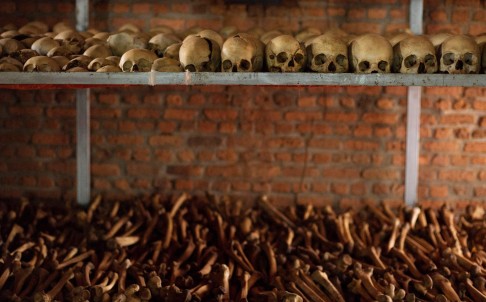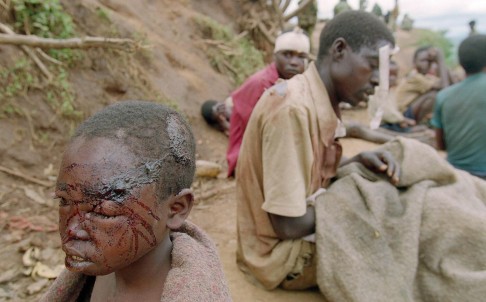Rwanda’s suffering goes on, two decades after genocide killed 800,000
Memories of slaughter that saw a death every 10 seconds are still raw because of a chronic lack of psychological care and health provision
PUBLISHED : Thursday, 03 April, 2014, 10:39pm
UPDATED : Thursday, 03 April, 2014, 10:39pm
Agence France-Presse in Nyamata

The skulls of genocide victims on display at the church in Nyamata, Rwanda, which has become a memorial to the horrific slaughter that began on April 7, 1994. Photo: AFP

Wounded refugees at a camp in Kibeho, Rwanda, in April 1995. Photo: AFP
Sitting very still, hands folded and with a soft voice, Jean-Bosco Rurangirwa relives the trauma of seeing his family hacked to death as they sheltered with thousands of others in a church.
Twenty years ago, it is said one person died every 10 seconds over a period of 100 days as government troops joined by armed militia swept through Rwanda.
In all, at least 800,000 people, mostly ethnic Tutsis, were victims of the genocidal slaughter that started on April 7, 1994.
Countless others were raped or maimed and trauma is said to affect a quarter of the population.
"Sometimes I still feel human, but other times I feel crazy," said Rurangirwa, whose family died at Nyamata church, 35 kilometres from the capital Kigali.
"When you've seen so many dead bodies - I saw about 200, including my wife, my father, my son and my daughter - you lose your mind. You become crazy." He and about 50 others escaped Nyamata church at night after hiding under the benches and the dead bodies of his family, friends and neighbours.
But they were picked off on the way by the Interahamwe, marauding gangs of civilians from the Hutu ethnic group.
The daughter he escaped with - his only surviving child - was also murdered, leaving Rurangirwa alone and fleeing to neighbouring Burundi for safety. Two decades later, Rurangirwa has remarried and has four children, but admits he struggles to come to terms with the brutality.
"When you've seen the bodies of your children lying next to your wife, there are just no words."
Naason Munyandamutsa, deputy director of Rwanda's Institute of Research and Dialogue for Peace, arrived in 1994 as the country's only psychiatrist.
"We didn't really know how to deal with this. In our culture, we didn't have a language to speak to our communities about trauma," he said. With only ihamamuka, a word used to describe the paralysing fear of over-beaten cows, and ihungabana, a crippling distress that can leave you breathless, psychiatrists had to invent new terms to help more than a quarter of the population (26 per cent) said to be suffering post-traumatic stress disorder.
Munyandamutsa said Rwanda also had to create a national health policy from scratch. From one psychiatrist two decades ago, there is now one in every district. But it's still not enough.
"There's a tiny percentage that have managed to get therapy," he said, while "the problem has become more complex".
Many live with a sense of calm, in a country where expressions of anger have been muted so as not to slip towards hatred and the danger it brings. "People are scared of speaking as before … and no one knows the language of healing," he said.
For Rurangirwa, who has forgiven fellow villagers who admitted being in the gang that killed his family, the fear of another genocide and the images burned into his mind of the church will always remain. "There are some things that can't be forgotten. As a human being, there are things you can't let go of or talk about."
It is around April each year that the real rawness of what happened in Rwanda can be seen.
"What we notice in times of commemoration is some people stunned to silence, falling over, having epileptic fits or crying," said Munyandamutsa, who regards these actions as a cry for help. "Sometimes you have to shout to make the deaf hear."
Rurangirwa is still struck down by fear when he hears news of Hutu militias launching attacks in the neighbouring Democratic Republic of Congo, and sees killers from 20 years ago who have been freed from prison and greet him in the street. But for the most part, "life has restarted ... that hurt has faded", he said.
For Munyandamutsa, who witnessed bullet-riddled bodies in hospitals and listened to the deep trauma of children who saw their parents killed, Rwanda's transformation has been huge.
"It was night at that time, a kind of darkness, a deep one," he said. "Now the darkness hasn't gone totally, but we have light.
"And we can open the door, and the window, to be able to look to the future."
